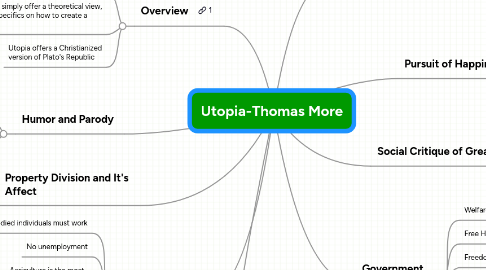Utopia-Thomas More
da Natalie Alas

1. Overview
1.1. Thomas More's Utopia is a Christian Humanist View of an ideal society
1.2. More does not simply offer a theoretical view, but provides specifics on how to create a world
1.3. Utopia offers a Christianized version of Plato's Republic
2. Humor and Parody
2.1. Utopia means nowhere
2.2. The community political system is called a Sty
3. Property Division and It's Affect
3.1. No private property
3.2. All goods and resources are stored in warehouses and accessible upon request
3.3. Houses are rotated amongst people every ten years
3.4. Deliberate Simplicity of Goods
3.4.1. All people wear similar clothing
4. Working Life
4.1. All able bodied individuals must work
4.2. No unemployment
4.3. Agriculture is the most important branch of the workforce
4.4. Every citizen must learn at least one other trade along with agriculture-ish things.
4.5. Work is six hours a day
5. Slavery
5.1. Every household has two slaves
5.2. Either criminals or foreigners
5.3. Chained in gold
5.4. Periodically released for good behavior
5.5. Did dirty work
6. Utopia-The last great Christian synthesis of the Renaissance
6.1. The Christian synthesis is Christ's gospel of caring for the poor, the oppressed and the downtrodden
6.2. The Platonic, Republican tradition is the Greek aspect of the synthesis
6.3. More wrote Utopia with a comedic tone, allowing him to speak his truth while telling a deeper story
7. Government
7.1. Welfare State
7.2. Free Hospital
7.3. Freedom of Religion
7.4. Euthenasia
7.5. No Lawyers
7.6. Laws are purposefully simple
8. Social Critique of Great Britian
8.1. More is presenting this utopia in opposition to Great Britian's current government
8.2. He is presenting what it should be
9. Pursuit of Happiness


